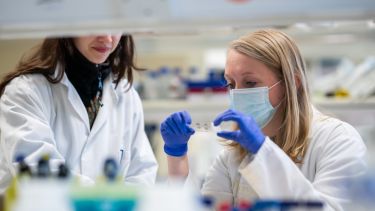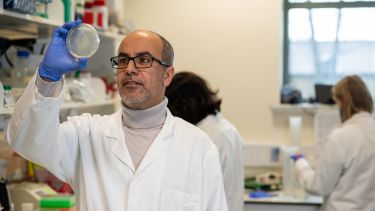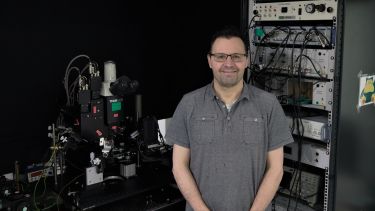Treating incurable conditions
It's not just rare conditions that could benefit from gene therapy. The University of Sheffield is pioneering gene therapy treatments for inherited forms of MND and dementia. And we're investigating how it could help age-related hearing loss, kidney disease and cancer.

New treatments for MND and dementia
For some people, ‘faulty’ inherited genes can contribute to neurological diseases like Motor Neurone Disease (MND) and frontotemporal dementia (FTD). These conditions are often caused by a complex mix of factors. But harmful variations in our genes can increase the risk of getting the disease alongside environmental factors.
Around 1 in 8 people who get frontotemporal dementia will have relatives who were also affected by the condition. And approximately 1 in 15 people with MND will have relatives with the disease, or with the related condition - frontotemporal dementia (FTD).
When this happens, we say the person has familial MND or familial FTD, meaning a genetic contribution is the major factor in causing the disease.
Genes instruct the body to create proteins that fuel our organs. But for people with frontotemporal dementia, a faulty gene means protein builds up abnormally and damages brain cells. It affects the front and sides of the brain (the frontal and temporal lobes). These areas of the brain are important for controlling language, behaviour, and the ability to plan and organise.
Dementia mostly affects people over 65, but frontotemporal dementia tends to start at a younger age. Most cases are diagnosed in people aged 45-65. Like other types of dementia, frontotemporal dementia tends to develop slowly and get gradually worse over several years.
But research from the University of Sheffield is offering hope to families with these devastating conditions through new gene therapy treatments.
Gene therapy modifies a person’s faulty genes to treat or cure disease. Gene therapies can work by:
- Replacing a disease-causing gene with a healthy copy of the gene
- Inactivating a disease-causing gene that is not functioning properly
- Introducing a new or modified gene into the body to help treat a disease
At the University of Sheffield researchers are using ‘viral vectors’ to develop treatments for inherited genetic conditions, including FTD and MND. This is called 'AAV' (Adeno-associated virus) gene therapy. By stripping away the harmful properties of a virus, it can then be used as a 'vector' to deliver a ‘therapeutic gene’ into a patient’s cells. This treatment can replace or switch off a faulty gene that’s damaging tissue in the body. Alleviating or even reversing the impact of genetic diseases.
We're currently investigating three different types of gene therapy treatments for frontotemporal dementia and two new treatments for familial MND.
Find out more about MND and FTD research
The University of Sheffield is a world-leader in gene therapy research. Our scientists and clinicians work together with experts in translational medicine, using the latest research to help patients.
Potential to treat age-related hearing loss
Age-related hearing loss, otherwise known as Presbycusis, is the most common sensory disorder. It is estimated that by 2050, it will affect almost one billion people.
Walter Marcotti, a Professor of Sensory Neuroscience at the University of Sheffield, describes the process of age-related hearing loss.
He says: “We lose sensory cells that detect sound, without which there is no sound processing. If you lose a portion of these cells but you are quick enough to implement cochlear implants, then you can still preserve some of the ear.
But the problem with age-related hearing loss is that you lose not only the sensory cells but also the fibre that goes from the ear to the brain. Even if you shout in someone’s ear or implement a hearing device there is nothing that can move the sound from the ear to the brain. And that is one of the major issues that we have with aged related hearing loss.”
Aged related hearing loss causes elderly people to feel isolated as they struggle to socialise with others.
This can lead to conditions such as depression, and research shows there is a link between age-related hearing loss and neurodegenerative conditions such as Alzheimer’s.
Currently, there is no cure for age-related hearing loss as Professor Marcotti explains: “When you go to the hospital and they diagnose you with age related hearing loss, it is already too late, because the equipment currently used in the ENT clinic is not sophisticated enough to detect the early signs of age-related hearing loss.”
However, there is hope that with further research, Age-related hearing loss can be delayed or even prevented.
The construction of the Gene Therapy Innovation and Manufacturing Centre (GTIMC) in Sheffield and bioreactor appeal will allow scientists to translate their research and apply it to humans.
If one day a treatment to prevent or delay age-related hearing loss were to be found, there is no doubt the treatment would be life-changing for millions of people across the world.
Find out more about Hearing Loss research
How you can help
In order to produce the viral vectors for gene therapy treatments we need large, specialised machines. To accelerate research towards clinical trials, we need to get our labs in the new GTIMC up and running as soon as possible.
That’s why the Sheffield community is coming together to help raise £200,000 for a Bioreactor.
This technology will enable researchers to incubate the cells needed for gene therapy at consistent environmental conditions. Having this specialist equipment will mean we can get official accreditation that proves our treatments are ‘medical grade’ and ready to be used with patients in clinical trials. The first research projects set to benefit are rare conditions and MND.
For families desperately waiting for a treatment, your help can’t come soon enough.
Having this piece of equipment at the GTIMC will help to produce treatments for up to 5 conditions a year. This will help push research from the lab to clinical trials as soon as we can. Ultimately leading to treatments for thousands of diseases.


